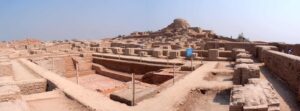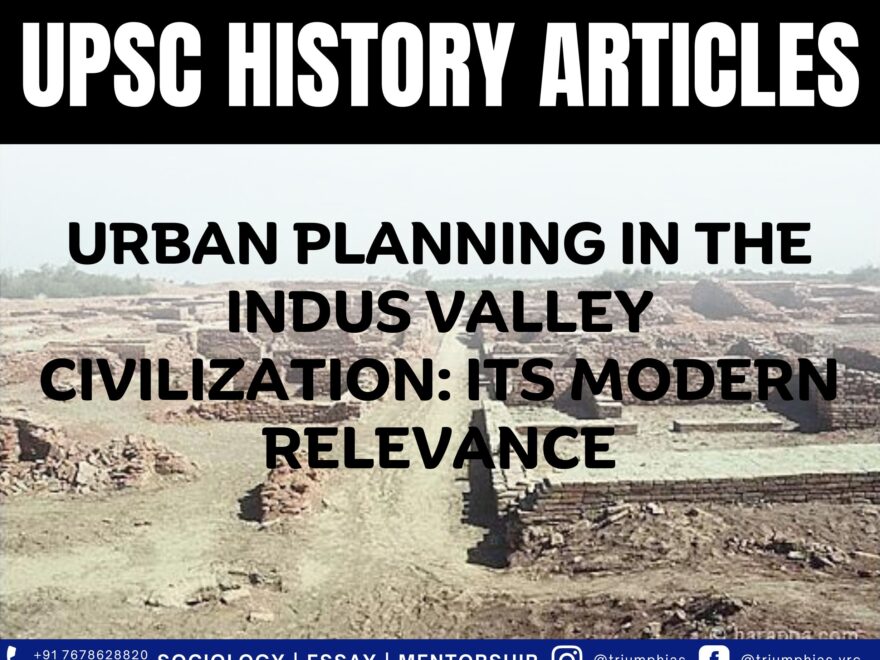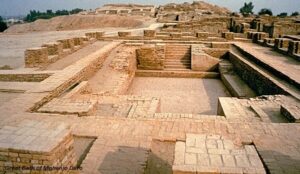Urban Planning of Indus valley civilization
(Relevant for Historical Section of General Studies Paper Prelims/Mains)

The Indus Valley Civilization (IVC) thrived during its formative years from 3300 to 1300 BCE, followed by its mature phase from 2600 to 1900 BCE. This civilization’s territory stretched alongside the Indus River, encompassing regions that are now found in northeast Afghanistan, Pakistan, and northwest India.
Among the early civilizations of antiquity, including Ancient Egypt and Mesopotamia, the Indus Valley Civilization (IVC) held the widest geographical expanse. Notably, Harappa and Mohenjo-Daro stood as the prominent urban centers of this civilization, emerging around 2600 BCE within the Indus River Valley, specifically within the Sindh and Punjab provinces of present-day Pakistan. The excavation and unveiling of these cities during the 19th and 20th centuries yielded valuable archaeological insights into ancient societies.
Key features of IVC are:
- It features an advanced urban planning structure.
- The urban layout includes a citadel or acropolis, which was likely inhabited by the ruling elite.
- Beneath the citadel in each city, a lower town housed brick residences, occupied by the general populace. Notably, the cities were organized in a grid-like pattern, which is a noteworthy aspect of their design.
- The presence of granaries was a significant feature within the Harappan urban centers.
- The utilization of fired bricks was a distinctive characteristic of construction in Harappan cities.
- The drainage system in Mohenjodaro stood out as remarkably efficient.
- In nearly all cities, each dwelling, irrespective of size, possessed its own courtyard and bathroom. Wide streets intersecting at right angles, forming a grid layout, were a prevalent feature in the urban planning of the Harappan cities, echoing a common element in modern urban design.
Influence of Indus valley civilization in present times
- Contemporary Chandigarh City: Constructed in modern times, Chandigarh’s layout features a rectangular shape and grid system, promoting efficient traffic movement and a reduced spatial footprint. Similar to the Indus Valley Civilization, a clear distinction between private residences and public areas was maintained.
- Upper and Lower Town Layout in the Present: The principles observed in the Indus Valley Civilization appear to have strongly influenced the division of today’s urban landscapes. Historical urban areas were divided into dedicated sections for the elite, housing for the general population, communal bathing facilities, and more. These concepts have significantly influenced the design of current city centers, suburban neighborhoods, governmental edifices, and other modern structures.
- Storage Facilities: The design of contemporary storage facilities seems to draw inspiration from ancient trading zones, granaries, and harbor areas.
- Effective Drainage Systems: The cities developed during the Indus Valley Civilization boasted sophisticated sewage and water management systems. Numerous archaeological sites from this period featured interconnected houses with varying numbers of rooms, equipped with excellent drainage infrastructure. Similarly, in present-day urban centers, we encounter comparable drainage networks where household waste is channeled through internal systems and ultimately connected to external sewage networks.
- Cultural and Religious Continuity: Elements of the Indus Valley Civilization’s religious practices are still observed today. For instance, the deity Pashupati from the IVC is revered as Shiva, and many rituals associated with fertility, as well as the veneration of trees, snakes, and phallic symbols, persist in India and neighbouring regions.
Urban planning in the modern era is inferred to share many characteristics with that of the civilizations of the Indus valley. Town planning at the time was done efficiently and in a futuristic manner using new methods.
To master these intricacies and fare well in the Sociology Optional Syllabus, aspiring sociologists might benefit from guidance by the Best Sociology Optional Teacher and participation in the Best Sociology Optional Coaching. These avenues provide comprehensive assistance, ensuring a solid understanding of sociology’s diverse methodologies and techniques.
Indus Valley Civilization, Urban Planning, Harappa, Mohenjo-Daro, Ancient Civilizations, Archaeology, Grid Layout, Drainage System, Modern Influence, Chandigarh, Ancient India, City Design, Indus Valley Civilization, Urban Planning, Harappa, Mohenjo-Daro, Ancient Civilizations, Archaeology, Grid Layout, Drainage System, Modern Influence, Chandigarh, Ancient India, City Design, Harappa Civilization, Mohenjo-Daro Civilization, Best Sociology Optional Coaching, Sociology Optional Syllabus.

Choose The Best Sociology Optional Teacher for IAS Preparation?
At the beginning of the journey for Civil Services Examination preparation, many students face a pivotal decision – selecting their optional subject. Questions such as “which optional subject is the best?” and “which optional subject is the most scoring?” frequently come to mind. Choosing the right optional subject, like choosing the best sociology optional teacher, is a subjective yet vital step that requires a thoughtful decision based on facts. A misstep in this crucial decision can indeed prove disastrous.
Ever since the exam pattern was revamped in 2013, the UPSC has eliminated the need for a second optional subject. Now, candidates have to choose only one optional subject for the UPSC Mains, which has two papers of 250 marks each. One of the compelling choices for many has been the sociology optional. However, it’s strongly advised to decide on your optional subject for mains well ahead of time to get sufficient time to complete the syllabus. After all, most students score similarly in General Studies Papers; it’s the score in the optional subject & essay that contributes significantly to the final selection.
“A sound strategy does not rely solely on the popular
Opinion of toppers or famous YouTubers cum teachers.”
It requires understanding one’s ability, interest, and the relevance of the subject, not just for the exam but also for life in general. Hence, when selecting the best sociology teacher, one must consider the usefulness of sociology optional coaching in General Studies, Essay, and Personality Test.
The choice of the optional subject should be based on objective criteria, such as the nature, scope, and size of the syllabus, uniformity and stability in the question pattern, relevance of the syllabic content in daily life in society, and the availability of study material and guidance. For example, choosing the best sociology optional coaching can ensure access to top-quality study materials and experienced teachers. Always remember, the approach of the UPSC optional subject differs from your academic studies of subjects. Therefore, before settling for sociology optional, you need to analyze the syllabus, previous years’ pattern, subject requirements (be it ideal, visionary, numerical, conceptual theoretical), and your comfort level with the subject.
This decision marks a critical point in your UPSC – CSE journey, potentially determining your success in a career in IAS/Civil Services. Therefore, it’s crucial to choose wisely, whether it’s the optional subject or the best sociology optional teacher. Always base your decision on accurate facts, and never let your emotional biases guide your choices. After all, the search for the best sociology optional coaching is about finding the perfect fit for your unique academic needs and aspirations.
To master these intricacies and fare well in the Sociology Optional Syllabus, aspiring sociologists might benefit from guidance by the Best Sociology Optional Teacher and participation in the Best Sociology Optional Coaching. These avenues provide comprehensive assistance, ensuring a solid understanding of sociology’s diverse methodologies and techniques. Sociology, Social theory, Best Sociology Optional Teacher, Best Sociology Optional Coaching, Sociology Optional Syllabus.
Best Sociology Optional Teacher, Sociology Syllabus, Sociology Optional, Sociology Optional Coaching, Best Sociology Optional Coaching, Best Sociology Teacher, Sociology Course, Sociology Teacher, Sociology Foundation, Sociology Foundation Course, Sociology Optional UPSC, Sociology for IAS,
Follow us :
🔎 https://www.instagram.com/triumphias
🔎https://www.youtube.com/c/TriumphIAS
https://t.me/VikashRanjanSociology
Find More Blogs
|
Scope of the subject and comparison with other social sciences |
|||
|
|
|
|
Modernity and social changes in Europe |


